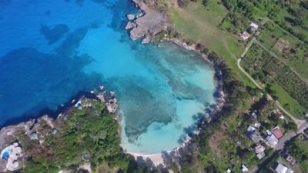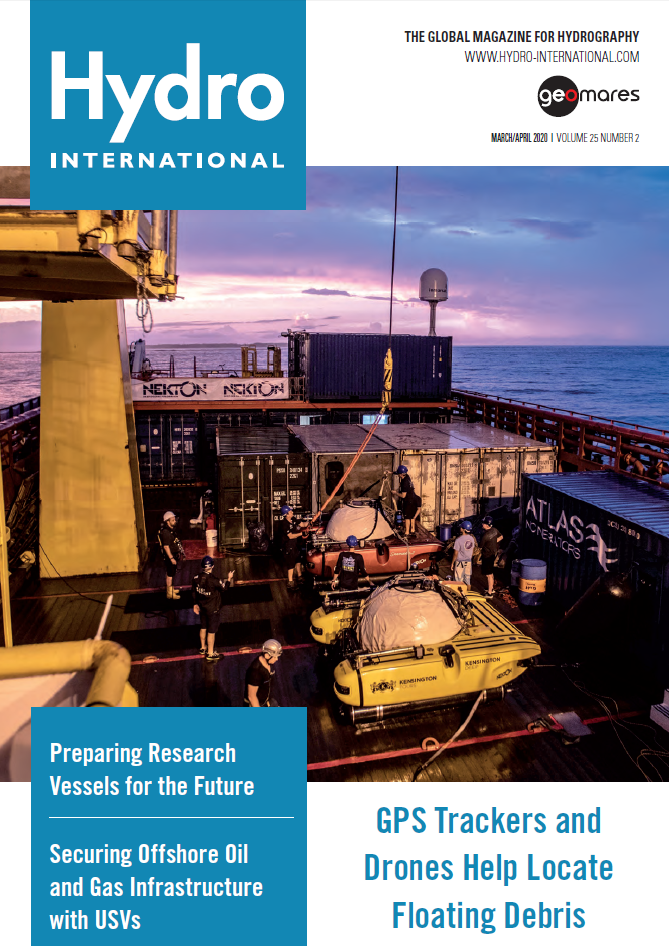On the front cover: The Seychelles and Maldives are undertaking a major joint marine research expedition to explore and conserve the Indian Ocean, called ‘First Descent: Midnight Zone’. It is a 35-day mission to support the sustainable governance of the Seychelles and Maldivian ocean including the protection of 629,000 km2.
This issue of Hydro International includes the following articles:
- Interview with Mark Heine, CEO of Fugro
- GPS Trackers and Drones Help Locate Floating Debris
- Preparing the European Fleet of Research Vessels for the Future
- Securing Offshore Oil and Gas Infrastructure with Unmanned Surface Vehicles
Read the full magazine here
Interview with Mark Heine, CEO of Fugro
 Mark Heine is chairman of the board and CEO of Fugro, with the headquarters in the Netherlands. Fugro is the leading and largest specialised survey company in the world, serving the full lifecycle of assets, and calls itself a Geo-data specialist. For the avid mountaineer Heine, challenges are never too high to take on, not even heading up a multinational in transition, from a company largely dependent on the oil and gas industry to one that wants to co-create a sustainable and liveable world. We talked to Mark Heine about leadership style, strategies for finding new employees, and Seabed 2030. About this ambitious project, Heine says ‘Commercial companies need to work together with NGOs and academia to make this happen.’ Read the full interview here...
Mark Heine is chairman of the board and CEO of Fugro, with the headquarters in the Netherlands. Fugro is the leading and largest specialised survey company in the world, serving the full lifecycle of assets, and calls itself a Geo-data specialist. For the avid mountaineer Heine, challenges are never too high to take on, not even heading up a multinational in transition, from a company largely dependent on the oil and gas industry to one that wants to co-create a sustainable and liveable world. We talked to Mark Heine about leadership style, strategies for finding new employees, and Seabed 2030. About this ambitious project, Heine says ‘Commercial companies need to work together with NGOs and academia to make this happen.’ Read the full interview here...
European Research Vessels
Recently, the European Marine Board published a report on the current status of the European fleet of research vessels. This so-called Position Paper describes how the fleet will need to develop in the future to ensure that it will continue to provide the same high level of support to science and hydrography globally, as well as highlighting ways in which management could be made more efficient. This article is an extract of the report. Read on...
Mapping the Caribbean
 The Caribbean islands are developing states that struggle to maintain a delicate balance between economic expansion and environmental preservation. Hydrographic mapping, a critical element in achieving this equilibrium, has been a service provided inconsistently by the developed nations upon which many of the islands are still dependent. Affordable new geospatial technologies, however, offer Caribbean islands the opportunity to reduce their traditional reliance and assume greater control over their economies and natural resources. Read on...
The Caribbean islands are developing states that struggle to maintain a delicate balance between economic expansion and environmental preservation. Hydrographic mapping, a critical element in achieving this equilibrium, has been a service provided inconsistently by the developed nations upon which many of the islands are still dependent. Affordable new geospatial technologies, however, offer Caribbean islands the opportunity to reduce their traditional reliance and assume greater control over their economies and natural resources. Read on...
Securing Offshore Oil and Gas Infrastructure with USVs
 The enormous investment America’s energy companies have made in their offshore oil and gas rigs is one that these companies must protect against failure, sabotage, or other hazards. Protecting these expensive and vulnerable rigs is a first order priority for the industry and one that is increasingly expensive. Current means of inspecting these rigs are slow, expensive and hazardous. Employing commercial-off-the-shelf USVs that can be rapidly reconfigured with a diverse range of sensors can enhance the ability to deliver energy to America and the world. This is a win-win for the energy industry, says George Caldorisi when he describes the securing of oil and gas infrastructure with Unmanned Surface Vehicles. Read on...
The enormous investment America’s energy companies have made in their offshore oil and gas rigs is one that these companies must protect against failure, sabotage, or other hazards. Protecting these expensive and vulnerable rigs is a first order priority for the industry and one that is increasingly expensive. Current means of inspecting these rigs are slow, expensive and hazardous. Employing commercial-off-the-shelf USVs that can be rapidly reconfigured with a diverse range of sensors can enhance the ability to deliver energy to America and the world. This is a win-win for the energy industry, says George Caldorisi when he describes the securing of oil and gas infrastructure with Unmanned Surface Vehicles. Read on...





